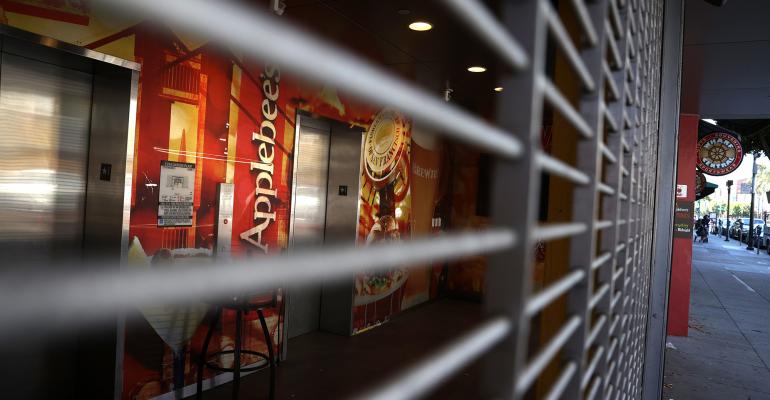The single-tenant net lease market has been flying below the radar when it comes to distress caused by the pandemic recession. In fact, investors seeking a safe haven for capital have continued to pursue net lease assets backed by strong credit tenants. However, some industry players see cracks emerging, particularly in hard hit sectors such as restaurants, fitness centers and big-box retail.
There are plenty of examples of that distress emerging with more than two dozen bankruptcy filings from restaurant groups in 2020, including Bar Louie, California Pizza Kitchen and large franchisee groups operating brands such as Applebee’s, Golden Corral and Pizza Hut. Movie theater operator AMC Entertainment Holdings Inc. has stepped back from the brink of bankruptcy—at least for now—after successfully lining up $917 million in new equity and debt financing to help the company weather its continued business disruption and reduced operating capacity.
To address the pockets of distress in the net lease sector, investment brokerage firm B+E. has launched a new division to help special servicers and debt providers with non-performing debt and distressed assets specific to single-tenant net lease assets. Timothy Taylor joined B+E in January as a senior director in the firm’s New York City office to lead the new division. Taylor has a long track record in commercial real estate in the pricing, structuring and placement of performing and non-performing and distressed debt and equity. His previous positions include serving as the former head of special situations at Ten-X Commercial and as a managing director at Cantor Commercial Real Estate, the real estate finance arm of Cantor Fitzgerald.
WMRE recently spoke with B+E CEO and Co-founder Camille Renshaw to hear more about the new platform and her views on distress now emerging in the net lease sector.
This interview has been edited for style, length and clarity.
WMRE: Can you expand on what motivated you to create this division and what services you will provide?
 Camille Renshaw: Unfortunately, COVID has disrupted a number of business lines, including things like restaurants, casual dining, fitness centers and gyms. We anticipate that the debt behind the single assets that those companies occupy will end up as non-performing or under-performing. Just like we saw in the Great Recession, we anticipate that those loans and possibly those assets will be changing hands.
Camille Renshaw: Unfortunately, COVID has disrupted a number of business lines, including things like restaurants, casual dining, fitness centers and gyms. We anticipate that the debt behind the single assets that those companies occupy will end up as non-performing or under-performing. Just like we saw in the Great Recession, we anticipate that those loans and possibly those assets will be changing hands.
Again, that is just one of the unfortunate outcomes of what’s going on in the economy right now. A lot of these are going to go vacant, or the lease itself is going to be completely restructured. So, we are preparing to help our client and the special servicers who will be working with those debt instruments and finding new homes for the loans and new homes for the assets depending on the situation.
WMRE: A lot of the stress we’ve been hearing about seems to be leapfrogging over the single-tenant net lease market. What kind of stress are you seeing at this point?
Camille Renshaw: Much of net lease is very stable and in high demand. That said, distress is emerging. Lenders are doing their best to give companies time—hoping that the market will change, hoping that tenants will recover, hoping that the next stimulus package comes along. We have $900 billion in federal stimulus coming that will help tremendously, but it is largely going to give companies two and a half more months of payroll. That money will likely get into the hands of folks in early February, and by mid-April it could be like the movie Groundhog Day and we’re going to have the same events all over again.
If we don’t have the majority of our citizens vaccinated to give us herd immunity, then consumer spending at retail locations will remain very low and many office buildings will remain vacant. The best estimates are saying herd immunity will happen in June or July. So, the real question mark between now and then is how long affected businesses can survive. If a tenant was having a hard time before COVID or was over-levered, then that tenant is now very weak and may not survive the full length of this crisis. So, we do anticipate disruption in this category.
Again net lease at large is doing really well. Quick service restaurants, grocery, industrial distribution centers and anything in the supply chain have maintained or increased revenues. Surprisingly, suburban office buildings are popular with investors again, and medical buildings are certainly experiencing cap rate compression.
WMRE: To your point about the delayed timing. Could that potentially snowball, or what do you see ahead for the volume and also the timing of that distress?
Camille Renshaw: It’s going to start in Q2. I don’t think it will be an avalanche in Q2, but the writing is on the wall for certain tenants. Real Capital Analytics has over 1,400 single-tenant assets on the watchlist, which gives you an idea that someone has missed a payment, or something is wrong.
WMRE: Will your new division be focused on single-tenant assets broadly, or are you focused on one particular property type?
Camille Renshaw: B+E focuses on all single-tenant assets. Probably half of what we do is industrial, 20 to 25 percent office and 20 to 30 percent retail. Most of the distress that we are seeing is in that retail category, some office and very little industrial.
WMRE: Who is your client focus? Special servicers and lenders, or are you working with investors looking to backfill empty properties?
Camille Renshaw: We are happy to help anyone at any stage in the full life cycle or ecosystem of single-tenant assets. Tim Taylor who has joined us to head this division was head of special situations at Ten-X when I was there as head of sales. Special servicers were the bulk of his clients. He is taking that specialty and combining it with ours in the single-tenant world.
Typically, when you are with one of the large national or international brokerages, the single-tenant team stays focused on stabilized assets and they kind of ignore the ones that break. A different brokerage division handles any type of asset in distress all in a bundle. That is not what B+E is doing. By marrying our team’s past experience selling non-performing assets with B+E’s single-tenant net lease relationships, data and insights, we can offer the best advisory and brokerage service for these assets.
WMRE: A lot of people are looking at 2021 as possibly a light at the end of the tunnel. Although there is always some churn in distressed assets, do you think this division has legs?
Camille Renshaw: I think it will be cyclical. Normally, special servicers get very active during down cycles. So, we will be more active in this division as product flushes out. A pretty deep bench of distressed assets is coming forward, and it could take a few years to flush it through. Special servicers are never bored, and it never goes completely quiet. So, we definitely want to help through the frenetic part of the cycle. I will welcome the point where the distress is flushed through system, but I do think it is going to take a little while.
It also is a case of the have and have nots. We have a lot of tenants who are doing great if you’re a 7-Eleven or a grocery or a pharmacy. But gyms, casual dining, movie theaters, urban office buildings, and other non-essential retailers are suffering. Many real estate properties will go back to lenders as a result, and we want to help these owners and lenders.

